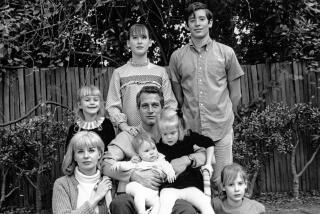Religion, Science May Turn a Page Over Textbook in Texas
William Dembski pulled a book from a pile in the basement of his country home and flipped to a page containing drawings of embryos. A gilded painting of the crucifixion hung on the wall behind him. He was in a bind, or so it would seem.
He is a scientist by trade, a Baylor University research professor, and knows that the theory of evolution is considered a cornerstone of modern science. But he is an evangelical Christian at heart, convinced that some biological mechanisms are too complex to have been created without divine guidance. The two schools -- science and religion -- have long been difficult to reconcile. But those days, he believes, are over.
This morning in Austin, the Texas Board of Education will begin two days of deliberation about whether to adopt 11 new high school biology textbooks for the 2004-2005 school year -- a transaction that, by some estimates, could cost the state $30 million.
A coalition of religious conservatives -- buoyed by the work of Dembski and a few others -- has launched a campaign to point out what it calls inaccuracies and inadequacies in the books’ presentation of evolution. Their goal: Persuade the board to reject the books or require publishers to edit passages about evolution, raising enough questions that some believe the door would be opened to teaching creationism in public schools.
“On some level, we are defining who we are,” said Dembski, 43, who holds degrees in science and divinity. “Might this reopen ideas about purpose, about nature, about God? It makes for a fairly explosive situation.”
The board’s decision will have a broad effect on the $4-billion textbook industry. Trailing California, Texas is the second-largest textbook buyer in the nation. Because of that clout, publishers often edit their books to earn consideration here. Other states as far away as New England buy books based on Texas’ vetting process.
In Texas, both sides of the debate see the dispute as a test for the emerging presence of evangelism in science, politics and government. The vote, state officials say, will be close. Several of the 15 elected members of the board of education have spoken openly about conflicted feelings.
“I can think of no word that crystallizes the debate of religion and science better than ‘evolution,’ ” said Mavis Knight, a board member, Sunday school teacher and activist in Dallas-area civic causes. Knight spoke at a Dallas conference organized this week by educators and religious leaders who say religious messages are vital but should be kept out of science classes.
“Is there compatibility between one’s faith and what we are taught about science?” she asked. “And if there is, where is the appropriate forum for that?”
The books, according to those lobbying the board to reject them, portray an unbalanced picture of evolution, one that is too clear-cut. The text is evidence, the group says, of a “naturalistic filibuster” that glosses over lingering questions. For example, they say, the books fail to delve into the “Cambrian explosion,” a period 500 million years ago when changes in some species appear to have occurred too quickly to have been produced by natural selection alone.
Although some educators and scientists call the campaign junk science and thinly veiled ideology, it has already won some victories.
In one book, a passage saying that fossils “explain” evolution has been changed to say that fossils “may explain” evolution. A reference to the Ice Age was changed recently from “millions of years ago” to “in the distant past” in a nod to people who read Scripture literally and believe the Earth is just thousands of years old.
The effort to rewrite textbooks here is led largely by a group called Texans for Better Science Education.
It recently circulated a message from a Colorado man whose daughter was killed in the 1999 Columbine High shootings. The father said that the teaching of evolution played a role in the shootings because one gunman wore a shirt bearing the words “Natural Selection” -- a contention that has outraged many educators.
The campaign is also allied with the Seattle-based Discovery Institute, which backs a theory known as “Intelligent Design.” The theory does not discard evolution, but believes it is insufficient to explain the complexity of some biological mechanisms -- leaving the possibility, the group says, for some sort of plan or design by an intelligent force. John G. West, a senior fellow at the Institute, said the group’s work is focused purely on science and has “nothing to do” with trying to allow religion into science classes.
Several donors who say they strive to discredit Darwinism have given millions of dollars to the Institute, where Dembski used to work. The donors include the wealthy Ahmanson family of Orange County, Calif., which has been tied in the past to a movement that sought to replace democracy with Christian theocracy. Philanthropist Howard Ahmanson has since said that he repudiates those ideas.
The activists are careful to point out that they are not calling explicitly for the teaching of religion in science classes. But many concede that if they poke enough holes in evolution, students would be hard-pressed to understand biology without incorporating the work of God.
“There are only two options here: We are all a great, big accident. Or we are not an accident,” said Ide Trotter, Texans for Better Science Education spokesman. “It’s one or the other, and science hasn’t proven which it is. People on the other side are fearful.”
Educators and scientists say they are not fearful, but concerned about the influence of evangelical activists. Volumes have been written discrediting the work of Dembski and other proponents of Intelligent Design, and their research is typically not published in peer-reviewed science journals.
“Intelligent Design has contributed absolutely nothing to science,” Sahorta Sarkar, a professor of philosophy and integrative biology at the University of Texas-Austin, said at the Dallas conference.
Educators and scientists fighting the textbook revisions readily agree that there are gaps in the record of evolution -- but they say the gaps are indications that science is a young field that is evolving itself.
“Nobody has ever claimed that evolutionary biology is finished and done,” Sarkar said. “That’s what makes it exciting.”
Samantha Smoot, executive director of the Texas Freedom Network, a coalition of activists and clergy that tries to counter the influence of what its Web site calls religious “extremists,” said there is “no debate about the theory of evolution within the scientific academy.”
“The politics of those in power can drive the learning of a whole generation of children,” she said. “These people say that these are not religious theories. Quite clearly, they are religious theories.”
Sarkar and other evolutionists charge that the work of “Intelligent Design” supporters isn’t science, but ideology dressed as science.
Several people at the Dallas conference charged that the campaign is part of an effort to bring religion into politics and government. Asked for examples, they said they viewed it in the same vein as the U.S. general who recently characterized the war on terrorism as a battle between Judeo-Christian tradition and Satan.
Liz Carpenter, an Austin writer who served as a speechwriter and press secretary for former President Lyndon B. Johnson and his wife, Lady Bird Johnson, recently told the education board at a public hearing that it must not allow the debate to be “defined by extremists.”
“I happen to be a Christian,” Carpenter said later. “I believe there are some things we really don’t know. But the right-wing Christians have overdone it. I think this is a test, a test about whether you truly believe in freedom.”
Further complicating the issue, though, both sides accuse the other of censorship.
“If there are holes in evolution, don’t cover them up,” said Ray Bohlin, a fellow at the Discovery Institute and the executive director of Probe Ministries, a Christian group. “Yes, this leaves open the opportunity for other ways of thinking to come in. And I don’t think there’s anything wrong with that.”
More to Read
Sign up for our Book Club newsletter
Get the latest news, events and more from the Los Angeles Times Book Club, and help us get L.A. reading and talking.
You may occasionally receive promotional content from the Los Angeles Times.







